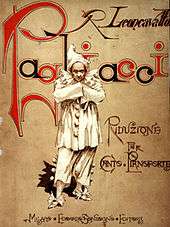Vesti la giubba

"Vesti la giubba" ("Put on the costume", sometimes translated as "On With the Motley")[1] is a famous tenor aria from Ruggero Leoncavallo's 1892 opera Pagliacci. "Vesti la giubba" is sung at the conclusion of the first act, when Canio discovers his wife's infidelity, but must nevertheless prepare for his performance as Pagliaccio the clown because "the show must go on".
The aria is often regarded as one of the most moving in the operatic repertoire of the time. The pain of Canio is portrayed in the aria and exemplifies the entire notion of the "tragic clown": smiling on the outside but crying on the inside. This is still displayed today, as the clown motif often features the painted-on tear running down the cheek of the performer.
Enrico Caruso's recordings of the aria, from 1902, 1904 and 1909, were among the top selling records of the 78-rpm era..[1][2]
This aria is often used in popular culture, and has been featured in many renditions, mentions, and spoofs.
Lyrics
 |
|
| Problems playing this file? See media help. | |
Recitar! Mentre preso dal delirio, |
Act! While in delirium, |
Samples
The melody of the song was utilized by the rock band Queen in their 1984 single "It's a Hard Life" when frontman Freddie Mercury sang the song's opening lyrics "I don't want my freedom, there's no reason for living with a broken heart."[3]